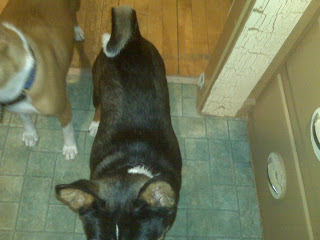Adopting a new dog is always a challenge, especially with dogs as unique as our Basenjis. Adopting an extremely fearful dog was a different challenge from every dog I've ever met. Dana Cole was wonderfully, almost brutally honest about Sana's behaviour, and stressed that progress with her would proceed in the tiniest of baby-steps. I was confident about two things. The first was that Bill and I could offer this wild little creature a safe, fairly quiet and routine home, and the second was that we were committed to helping her discover that life really was good. Our goal for her was that she become happy - simply that - and that she be able to relax and enjoy life. Anything else would be a bonus - we already had a dog who loved us, and Sana's life now would be all about Sana. God knows she had already paid her dues, and she deserved peace.
NOTE: Because we were dealing with one feral dog in our own home, we had the luxury of allowing her to set her own schedule and develop at her own pace with as little pressure from us as possible. And it IS a luxury - one that most foster homes may not be able to offer. There are different methods that can be used, especially for dogs in transition between their rescue and their forever homes that include a shortened timetable and more intensive conditioning. In no way do I mean to imply that there are not multiple roads to success. Everything else I say is nothing more than generalities about ADULT feral dogs learned directly from Sana and from all of the research I still do on the topic. I am not an expert, except in terms of our one special dog. Each and every dog will come with its own issues and own schedule of development!
Generalities:
-- A feral dog is hyper-sensitive to everything. Every tiny movement, every change in tone of voice, every sound from another room, EVERYTHING is a potential danger. With time, this eases, but I doubt that it will ever go away because it is exactly what was needed for sheer survival. It doesn't take long at all to learn that humans produce food and supply warm, comfy beds. It does take a very long time for an adult dog to learn broader concepts - that human touch is not only non-harmful but can actually bring pleasure, that "home" is a real place that will remain constant, that gentleness exists and will not go away and (most importantly) that the good things will happen every day.
-- By "it will take time", I do not mean that after the customary 6-8 weeks of adjustment time, a feral/un-socialized dog necessarily will be comfortable in their new home. The tiniest of baby steps are things to be celebrated - eye contact, choosing to approach even when there's no food, learning any basic obedience are huge signs of progress that MIGHT very well take months - or even years - not days or weeks. Feral animals truly are the closest things to visitors from another planet that most of us will meet. Again, they lived in a totally different world where every action and sound had to be instantly noted and analyzed, because danger could return at any moment. After about a year with us, we carefully began to refer to Sana as “extra-vigilant” rather than “extremely fearful” not only because it was a more positive description but because we were finally realizing that this was something that would remain part of her character forever. This characteristic also requires extra care in terms of protection. A feral dog will react INSTANTLY to a perceived threat – usually by bolting. It might be extremely difficult to retrieve a frightened, loose dog because every one of their instincts will be telling them to run and hide, and it’s quite possible that no stranger without a net would be able to catch them. We are fortunate that Sana, from the first day we had her, is highly motivated to stay safely in the comforts of our home, and to do her best to return there as soon as possible whenever stressed. It is actually more likely that feral dogs will incline to get AWAY from whatever frightened them, and to run, dig or climb if necessary. Bolting out a door or ripping a leash out of a hand may be a constant threat, so owners will need to be as “extra-vigilant” as their dogs to keep them safe – always and forever.
-- Becoming adjusted to a human household will come in time, with gentle routine being one of the best tools. Love, however, is an art best learned when young, and it is not a natural concept for a feral animal. Food can be a major motivation in learning the extra perks of living with people – Sana’s first true breakthrough came by way of “pizza bones” – and here again time will be involved. These dogs CAN and WILL learn to love, but they’re starting very late in terms of development, and it can feel like forever. After three and a half years, Sana will now (almost always) come to me when she feels threatened, or her leash is tangled around her legs, or she’s hurt, etc. She always sleeps pressed against me, fully expects to share any meal I eat, and in the last few weeks has finally begun to come to me to ask for petting. I know that she loves me, as well as relies on me and trusts me, and it fills my heart in ways I can’t even begin to describe.
-- Time – it all comes down to time and patience, and the desire to do it both FOR and WITH the dog. These dogs will be a challenge to even the most experienced of Basenji-folk, and many households will not be a good match for them. We all want to help in this extraordinary rescue situation, but unusual care will need to be taken in matching these survivors with their forever homes. I can’t wait to see how they’ll all be in five years or so!
I would be happy to discuss the details of our experience with anyone who might be interested. I can be reached at: bcomvp@yahoo.com or laura_whitney@harvard.edu or 781-643-5497.
Laura Whitney
Arlington, MA
P.S. Other than our usual Basenji resources, there are two sources of help I would recommend VERY highly:
1) There is a Yahoo-group called “Shy-K9s” that got me through my most discouraged moments. It is a wonderful group, even if you only read the archives. Only positive methods are discussed, the support is tremendous, and reading about professionals who are willing to spend YEARS helping dogs that they still cannot touch is humbling beyond words. These people GET IT, and I cannot recommend them highly enough.
2) Many people are not comfortable with the concept of using an animal-communicator (I wasn’t, at first) but I found that working with a communicator could give us a huge boost. It was very beneficial in interpreting Sana’s reactions to situations and helping her to know what changes and events (like travel) might be coming. I have worked with two (whose names I would happily pass on to anyone interested!), and both have been able to track physical and emotional changes at which I could only guess. One was amazingly helpful when Sana once got lost. Anyone interested should definitely get recommendation from someone they trust, because there are frauds out there, but there are people with astonishing gifts that can be of tremendous assistance. Again, I’d be happy to recommend the two with whom we’ve worked to anyone interested.















































